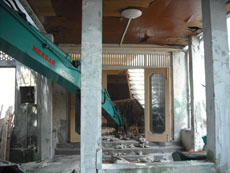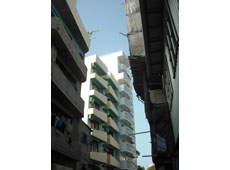The CEO of Male’ International Airport, which is currently operated by Indian infrastructure group GMR, has said that although the company had made certain mistakes in terms of its finance policy of late, management was confident of learning from them to deliver significant changes to the site over the next three months.
Andrew Harrison, who took the CEO position at Male’ international Airport when GMR took control of the site in November, told media today that despite significant work already underway on overhauling behind-the-scenes operations, he was still learning how to deal with stakeholders like airlines and exporters at the site.
The week has threatened to be potentially difficult for GMR, with reports emerging in the press of the company’s alleged plans to increase land lease rent at the airport by 50 percent – the first such price change enacted in a decade. News of the announcement had led some local airlines and a number of import companies raising concerns at the reported increases and the possible impacts on their operations.
Harrison nonetheless claimed that he hoped the public, as well companies working with the airport operator, would soon see more of the changes resulting from its investment in the form of operational and aesthetic improvements at the existing terminal.
“People are expecting to see a lot of change immediately, the change does take a little time, but actually there is a lot of work going on behind the scenes. What we will now see over the next three months is rapid progress where the changes will be more visible to the public,” he said.
“We had, through our concession agreement, been given a mandate to improve levels of service in the existing terminal areas, so this was focused on baggage processing time and baggage delivery time and the checking of passengers. What we are recognising is that people have much greater expectations, so we are spending more money than we are required to in terms of the concession agreement to actually make [the terminal] a much nicer environment.”
The pledge comes as newspaper Haveeru this week reported that airlines such as Island Aviation and seaplane group Trans Maldivian Airlines were concerned at how the implementation of future rent raises could impact on their operations.
Some importers working for the tourist trade have also told Minivan News that they have faced a sudden “100 percent increase” in charges for containers that they need to hire at the airport for their stock.
One importer and supplier of alcohol to a number of tourist properties in the Maldives, who wished to remain anonymous, told Minivan News that a number of the company’s business peers had looked to form a committee over concerns at rate hikes they claim have been deemed “non-negotiable” by GMR.
According to the supplier, the airport operator had acted “unprofessionally” in suddenly announcing that the monthly rates for 70 feet containers at the site were being doubled, meaning certain companies potentially face an additional bill of up to US$45,000 a year to work from the site.
Although the supplier said that they were being given a month to rewrite terms and conditions within new contracts that they were unhappy with, the container rent was seen as a “non-negotiable issue.”
In today addressing the issue of lease rent specifically for local airlines, Harrison denied that any official price had been set, adding that negotiations were now being held with key lease holders like Island Aviation and the company’s sea plane operators over cost amendments that he said remained fully open to negotiation.
Amidst press reports about certain concerns by some lease holders over the potential rise in airport rent and the possible impacts on their operations, Harrison stressed that in future, the company would aim to learn lessons and consult stakeholders “much in advance of any envisaged changes”.
However, the Male’ International Airport CEO claimed the company would still aim to push ahead with adjusted charges in areas such as land lease rent to ensure changes could continue to be funded at the airport. Harrison claimed that this rate increment would remain one of a “few” financial changes expected to be needed at the airport at present.
Though he did not confirm when the decision to potentially amend rent rates had been decided, Harrison claimed that GMR was working from a long-term development and cost plan set out in its original concession agreement.
“I want the airport to be profitable, but I want it to be responsibly profitable, because with those profits we are able to do many things including the development of the airport ongoing. [By] November 15 2011, most of this work will be done, but actually we will continue, it won’t end. There will continuous improvements all the time,” he added. “These improvements have a cost to them, so we need to have a business model that is responsibly profitable and trying to be responsibly profitable means that when you have different ways of doing things, you must engage your stakeholders in dialogue. We didn’t fix a [rent] price.”
According to Harrison, the potential increase in land rates from US$6 per square metre to US$9 for the same area were primarily expected to impact the operations of Island Aviation and the airport’s two seaplane operators with discussions already underway with them in addressing the issues.
A spokesperson for island Aviation confirmed to Minivan News that the company was currently in a “dialogue” with GMR though no out come had as yet been reached.
In trying to allay fears of further cost rises for stakeholders, Harrison claimed that he hoped to try and address the airport’s partners and customers like suppliers and service operators differently over future notices of change.
“I think one of the lessons that we are also learning is that people would like to have this dialogue much in advance of any envisaged changes. So what we are saying is that, ‘right, we have done a range of changes, let’s stop there now,’” he said. “Anything we want to do let’s have a discussion well in advance to understand the impact of changes we well make.”
Harrison took the example of requirements for new VIP and other lounges at the airport that had been requested by airlines to bring them up to the standards expected from “premium passengers”. The airport CEO said that he expected about US$500,000 to be spent on the project in total to try and meet the demands of airline companies.
“In this business model, what we’re trying to see is how much has to be spent and how which will be recovered in the time available. Don’t forget, this terminal has a life of about two and a half years before we move over to the new terminal and on the basis of that can we stay within the existing costs,” he said. “On the basis of that, can we stay within the existing costs? If we can’t what will be the difference [in charges]? Let’s discuss this with the airlines first before we announce, publish or indicate anything.”
In future, Harrison claimed that the company would try and change its current system of issuing communication about proposed changes before starting dialogue with the companies involved, claiming he would look for “better ways” to do things.
Alongside the issues of rent, Harrison conceded that he was not entirely happy with the manner that the company had reacted to a decision by the Maldivian government last week to amend an longstanding set US dollar exchange rate of Rf12.85 to within 20 percent above or below the figure to attempt to alleviate shortages of the currency.
“We’re human beings and sometimes we don’t always get it right. One example of where we didn’t get it right was that as soon as the announcement came from the Maldivian Monetary Autjority (MMA) about floating the exchange rate, we issued a communication announcing an exchange rate of Rf15.42 [to the US dollar],” he said. “That was incorrect of us to do so quickly. We didn’t need to do it. We could have waited to find out what financial institutions such as the banks were going to do before we did that. I have issued a further communication indicating that we will take the best available rate made by the three banks here in the Maldives.”
An interview Minivan News conducted with airport CEO Andrew Harrison last month about his experiences in the Maldives and plans for the airport can be read here.
Likes (0)Dislikes
(0)Dislikes (0)
(0) 
